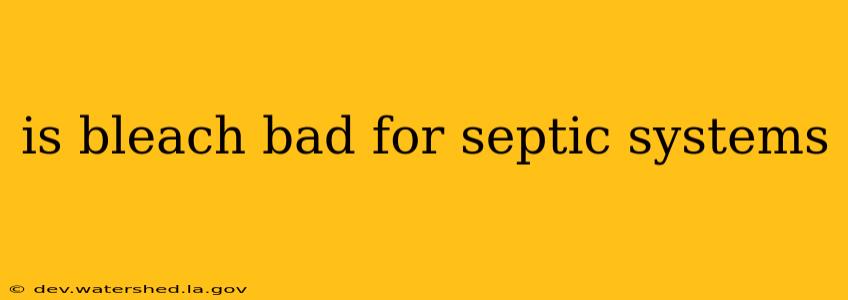Bleach is a common household cleaner, but its powerful chemical properties raise concerns about its impact on septic systems. The short answer is: yes, bleach can be harmful to your septic system, though the extent of the damage depends on several factors. This guide will delve into the specifics, answering common questions and offering safe alternatives.
How Does Bleach Affect Septic Systems?
Bleach, primarily sodium hypochlorite, is a strong oxidizing agent. In a septic system, this means it can kill not only harmful bacteria but also the beneficial bacteria essential for breaking down waste. These beneficial bacteria are the heart of the septic system's wastewater treatment process. Their destruction can lead to several problems:
- Slowed or stopped waste decomposition: Without sufficient bacteria, solid waste won't break down effectively, leading to a buildup of sludge in the septic tank. This can eventually clog the system, requiring costly pumping and potential repairs.
- Increased foul odors: Incomplete waste breakdown leads to the release of unpleasant odors.
- System failure: In severe cases, the septic system can fail entirely, requiring expensive replacement or extensive remediation.
- Environmental contamination: If the system fails due to bleach damage, untreated wastewater could leach into the surrounding soil and groundwater, potentially contaminating drinking water sources.
What Happens if You Pour Bleach Down the Drain?
The impact depends on the amount of bleach, the frequency of use, and the size and health of your septic system. A small amount of diluted bleach used infrequently might not cause immediate problems, but regular or excessive use can gradually damage the beneficial bacteria, eventually causing the issues mentioned above.
Can Bleach Damage Septic Tanks?
While bleach doesn't directly corrode the septic tank itself (unless it's made of a particularly susceptible material), the damage it inflicts on the bacterial ecosystem indirectly affects the tank's functionality. The accumulation of untreated waste puts a strain on the system, leading to potential damage and premature failure.
How Much Bleach is Too Much for a Septic System?
There's no magic number, but it's best to avoid pouring bleach down your drains entirely. Even small amounts, used regularly, can have a cumulative negative effect. The size of your septic tank also plays a role; a smaller system will be more vulnerable to the effects of bleach than a larger one.
What are Safe Alternatives to Bleach for Cleaning?
Many effective, septic-safe cleaning alternatives are available. Consider using:
- Baking soda and vinegar: This classic combination is effective for many cleaning tasks and poses no threat to your septic system.
- Borax: Borax is a natural cleaning agent that's generally safe for septic systems.
- Enzyme cleaners: These cleaners contain enzymes that help break down organic matter, assisting the beneficial bacteria in your septic system.
- Commercial septic-safe cleaners: Many commercially available cleaners are specifically formulated to be safe for septic systems. Check labels carefully.
What Should I Do if I Accidentally Poured Bleach Down the Drain?
If you accidentally pour bleach down the drain, don't panic. Flush the drain with plenty of water. The effects of a single incident might be minimal, especially if your system is healthy. However, avoid making it a regular practice. Monitor your system for any unusual signs, such as foul odors or slow drainage.
How Often Should I Pump My Septic Tank?
Regular septic tank pumping is essential to maintain its health and efficiency. The frequency depends on several factors, including household size, water usage, and the tank's size. Consult a septic system professional to determine the appropriate pumping schedule for your specific system.
By understanding the potential dangers of bleach and adopting safer cleaning practices, you can help prolong the life and efficiency of your septic system, saving money and protecting the environment. Remember, prevention is key. Opting for septic-safe cleaning products is the most effective way to safeguard your system's health and longevity.
